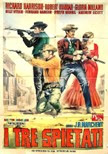As we know most of the Euro-westerns were co-productions from Italy, Spain, Germany and France which incorporated British and American actors to gain a worldwide audience. The films were shot silent and then dubbed into the various languages where they were sold for distribution. That means Italian, Spanish, German, French and English voice actors were hired to dub the films. Even actors from the countries where the film was to be shown were often dubbed by voice actors for various reasons such as the actors were already busy making another film, they wanted to be paid additional salaries for dubbing their voices, the actor’s voice didn’t fit the character they were playing, accidents to the actors and in some cases even death before the film could be dubbed.
I’ll list a Euro-western and the (I) Italian, (S)
Spanish, (G) German and (F) French, (E) English voices that I can find and once
in a while a bio on a specific voice actor as in Europe these actors are as
well-known as the actors they voiced.
Today we’ll cover “Gunfight at High Noon”
[(I) Italian, (S) Spanish, (G) German, (F) French, (E) English]
Jeff Walker – Richard Harrison (I) Giuseppe Rinaldi, S) Ángel María Baltanás, (G) Klaus Kindler
Pedro Ramirez – Fernando Sancho (I) Giorgio Capecchi, (S) Vicente Bañó, (G) Werner Lieven
Louise Walker – Gloria Milland (I) Rosetta Calavetta, (S) Celia Honrubia, (G) ?
Chet Walker – Robert Hundar (I) Nando Gazzolo, (S) Simón Ramírez, (G) Gert Günther Hoffmann
Brad Walker – Miguel Palenzuela (I) Sergio Graziani, (S) José Guardiola, (G) Manfred Andrae
Susannah Westfall – Gloria Osuna (I) Fiorella
Betti, (S) Josefina de Luna, (G) ?
CAPECCHI, Giorgio (1901 – 1968)
Giorgio Capecchi was born in Livorno, Italy on August 7, 1901. He was an Italian theater, film, voice actor and dubber. He was the son of the photographer Eugenio Capecchi and older brother of the baritone singer Renato Capecchi, he began his artistic career at a very young age with the theater company of Lyda Borelli, debuting in the role of Armando in “La signora delle camellie” by Dumas. During a break in the theatrical activity of touring, he stopped for a year in his city because of the death of his father and founded the "Filo drammatica Labronica", which he directed for some years with considerable success in the splendid setting of the Teatro San Marco, proposing works such as “The Merchant of Venice”, “Murder in the Cathedral” and “Resurrection”.
In the autumn of 1934, called on by Giovacchino Forzano, he landed at the cinema, shooting inside the Tirrenia establishments the film “Maestro Landi”, with Odoardo Spadaro, released in theaters at the beginning of 1935, and in “Campo di Maggioand Thirteen Men and a Cannon. He was married to Elba Gragnani and at the end of 1937 they moved to Rome, where he continued his film activity, collaborating, among others, with Mario Bonnardin Jeanne Doré in “Il ponte dei sospiri”. He was relegated to only character roles, despite the remarkable temperament that could have allowed him even more important parts.
Endowed with a warm and well-set voice, after acting on the radio with “Il signore delle ore 13”, Capecchi was invited by Mario Almirante, dubbing director at Scalera, in the synchronization rooms, and so he began to dub Tom Tyler in “Red Shadows”, Samuel S. Hinds in “The Eternal Illusion” and Melville Cooper in “Rebecca - The First Wife”. Later he lent his voice with deep tones to such great international actors, as Louis Calhern, Eduardo Ciannelli, Karl Malden and George O'Brien, and early actors, such as Charles Laughton, Jack Palance, Broderick Crawford, Edward G. Robinson, Orson Welles and Spencer Tracy. A founding member of CDC, he became one of the industry's strengths, returning only sporadically in front of the camera. Between 1952 and 1954 he filmed, with Raffaello Matarazzo, “Chi è senza peccato..., Torna!”, “Vortex”, “La nave delle donne male dette” and “La schiava del peccato”.
A recurring voice in science fiction films, he was also often used to voice cartoon characters, such as King Hubert in “Sleeping Beauty” and Sir Hector in “The Sword in the Stone”. His last performance at the cinema was in the film “La notte pazza del conigliaccio,” directed in 1967 by his nephew, Alfredo Angeli, which Capecchi brought from Livorno, after obtaining a degreei n law, to make him pursue a career as a screenwriter and director.
Giorgio Capecchi died in Rome on December 2, 1968, at the
age of 67.














No comments:
Post a Comment